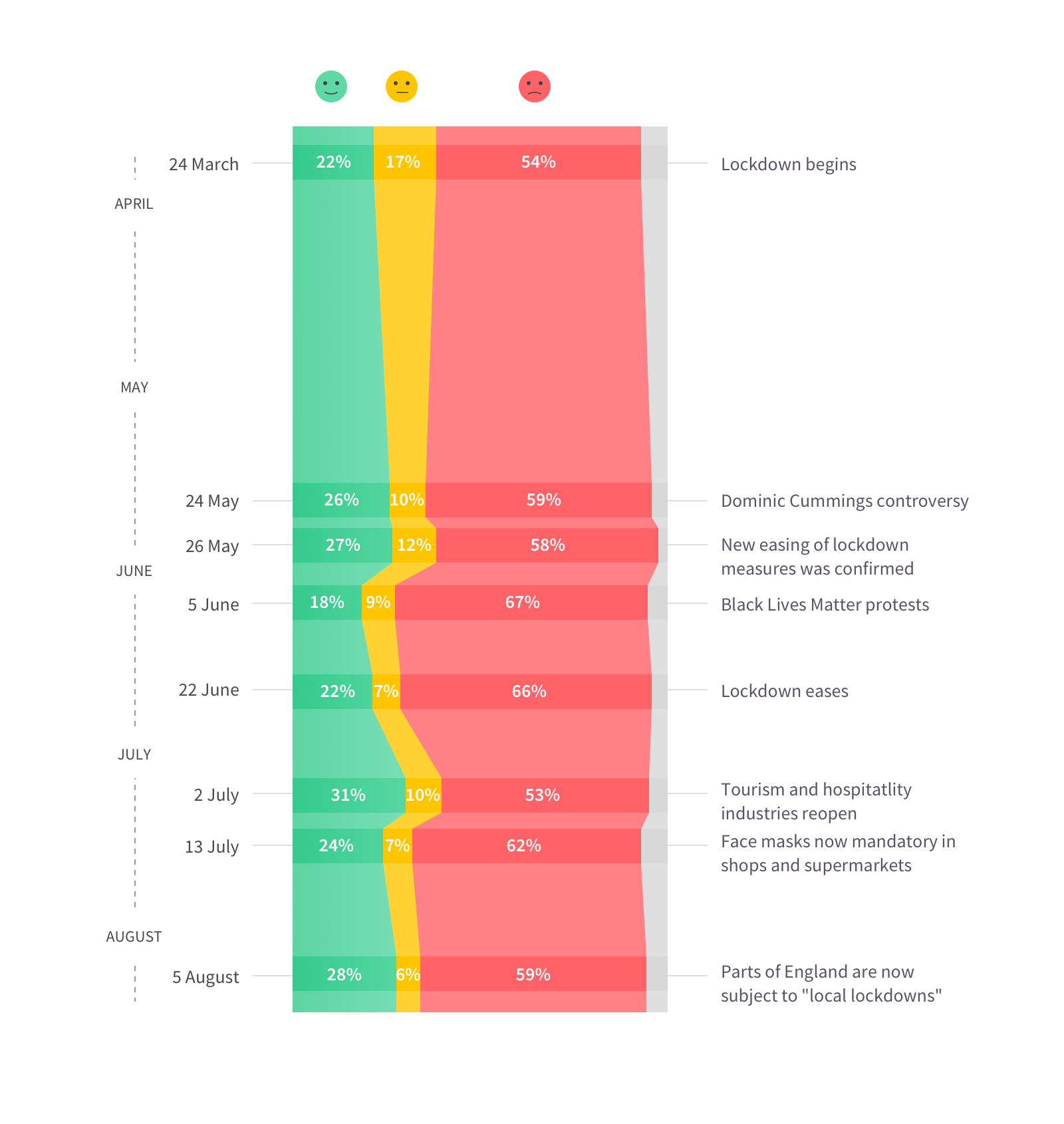COVID-19 UK: Myth Busting

We asked our UK audience some true or false questions about the coronavirus pandemic.
At CitizenMe we are in the business of transparency; we want to ensure that Citizens are aware of all the facts around the COVID-19 pandemic. Likewise, by wanting to understand how Citizens are thinking and feeling, it made sense to run research to cut through the myths that are circulating, and discover the right advice to follow. We took the official advice given by the World Health Organisation (WHO) and asked nine simple true or false questions on whether certain things were true or not.
https://www.who.int/emergencies/diseases/novel-coronavirus-2019/advice-for-public/myth-busters
The findings are interesting and highlight where Citizens are slightly in the dark about Coronavirus information. Here’s what we found for each myth listed:
Key Symptoms
‘The key symptoms of the COVID-19 virus are fever, tiredness, and dry cough.’
This was believed to be true by 93% of our audience in this survey. Ensuring the public knows the key symptoms is important in helping them to decide on whether to reach out for medical advice and support, rather than ignoring them. It’s also important to know what isn’t part of the symptoms in order to not overload resources in the health sector:

Hygiene
‘Alcohol-based hand-rub and soap with water ARE NOT effective ways to kill the virus.’
The advice from the WHO is that alcohol-based hand-rub and soap ARE effective ways to kill viruses that may be on your hands, so we were looking for our Citizens to answer false here. Most of them did so with 88% saying this information is indeed false.
Social Distancing vs Self-Isolation
‘There is a difference between self-isolating and social-distancing.’
Again, our Citizens were all in one camp with this piece of information, with 96% correctly believing this to be true. The WHO advises that ‘social-distancing’ is ‘maintaining at least 1 meter (3 feet) distance between yourself and anyone coughing or sneezing’. Self-isolation is staying at, and not leaving, home for any other reason than exercising.
Cold Weather
‘Cold weather is more effective at killing off the COVID-19 virus.’
The WHO advice is that there is no reason to believe that cold weather is effective in killing the coronavirus, or any other diseases for that matter. 91% of our community correctly said that this was false, in line with the advice given.
Animals
‘Animals, such as dogs and cats, are able to catch and transmit the virus’.
We start to see some discrepancies here as the WHO advice is that animals such as cats and dogs can’t catch or transmit the virus. 76% of our audience correctly thought that this claim was false. However, this does leave ¼ thinking that their household pets are also under threat from the virus:
Safe Packages
‘It is safe to receive packages from areas where COVID-19 has been reported.’
Interestingly, this is where we see our audience the most split in what they believe, with 43% thinking that this statement is false and that packages from COVID-19 infected countries are a risk. This statement is in fact true, according to the WHO: ‘previous analysis has shown that coronaviruses do not last long on objects such as letters or packages’. This illustrates that more needs to be done to clear up whether receiving items in the mail is safe:
Antibiotics
‘Antibiotics ARE NOT an effective treatment for the COVID-19 virus.’
This was correctly believed to be true by 88% of our audience. Antibiotics are ineffective against treating all viruses. However, the WHO do advise that they may be administered in hospitals because bacterial co-infection is possible:
Wearing Masks
‘You should wear a mask at all times when leaving the house.’
The WHO advice recommends that masks should only be used if a healthy individual is taking care of a person suffering from COVID-19 or if an individual is coughing and sneezing. Masks are effective when used with the correct sanitation methods, and disposing of them safely when finished with is also incredibly important in minimising the potential spread. This was correctly believed to be false by 83% of our audience here. NB The WHO advice at the time of writing
Incubation Period
‘The incubation period is up to a period of 7 days only.’
72% of our audience believed this to be false. However, this means that 28% believe that 7 days is the correct incubation period. This is half of what the WHO advises to be the incubation period of 14 days. Although the majority have the correct information here, for such a vital piece of information we suspect it’s important that this number be higher, thus ensuring that everyone is aware of the basic advice for this virus pandemic:
“The CitizenMe COVID-19 community is an open-data research project designed to enable the worlds citizens to share real-time opinions and data about COVID-19 with the institutions fighting the pandemic.”All data gathered is shared anonymously with health services and researchers, governments, journalists, charities – and with the general public. If you would like a full, anonymised copy of the data, please email us at COVID@citizenme.com






